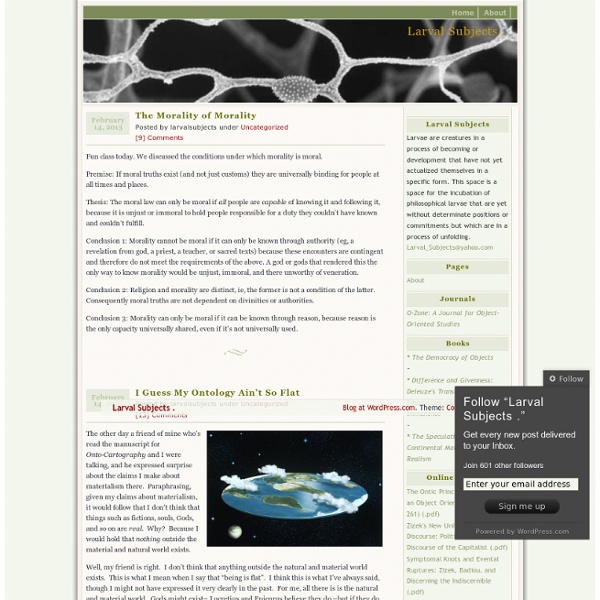



ECOLOGY WITHOUT NATURE Remodelista: Sourcebook for Considered Living Object-Oriented Philosophy Social Media Business Integration – Social Media Tuesday | Social Insights von QuestBack Home > Social Insights, Social Media Tuesday > Social Media Business Integration – Social Media Tuesday Holger Kayser von der corporate quality GmbH stellte die Prozesse vor, die für eine erfolgreiche Einführung von Social Media in Unternehmen notwendig sind. Der zehnte Social Media Tuesday konnte den Anwesenden somit wichtige Impulse geben, was bei der Integration von Social Media zu beachten ist. Die corporate quality GmbH ist ein Beratungshaus für Strategie bis hin zu Projektmanagement. Ansatz für Social Media Einsatz Die neuen Herausforderungen erfordern eine Entscheidung der Unternehmen in welche Richtung der Social Media Einsatz gehen soll. Die Konsequenzen des Social Media Zeitalters sind demnach: Zuhören und Antworten statt LautstärkeDezentrale KommunikationAus Fehlern lernen und erst recht weitermachenNeuausrichtung von RoI: Risk of Ignoring vs.
Object-Oriented France: The Philosophy of Tristan Garcia | Harman | continent. continent. 2.1 (2012): 6–21. The French philosopher and novelist Tristan Garcia was born in Toulouse in 1981. This makes him rather young to have written such an imaginative work of systematic philosophy as Forme et objet,1 the latest entry in the MétaphysiqueS series at Presses universitaires de France. The quality and scope of Forme et objet took few observers by surprise, since Garcia has been treated as an emerging philosopher to watch across half a decade of Parisian oral tradition. Given this prolific and versatile track record, an optimistic scenario might envisage the young Garcia as one of those combined literary/philosophical talents who appear intermittently in France across the centuries: Jean-Paul Sartre is merely the most famous recent case. The present article is confined to Forme et objet. Otherwise, the structure of Forme et objet is surprisingly simple. Before doing so, it will be useful to situate Garcia biographically (as much as I am able) and philosophically. 1.
SloDive - Dive Into Inspiration Objects as Temporary Autonomous Zones | Morton | continent. continent. 1.3 (2011): 149-155. The world is teeming. Anything can happen. John Cage, “Silence” 1 Autonomy means that although something is part of something else, or related to it in some way, it has its own “law” or “tendency” (Greek, nomos). Life, and in particular human life, and in particular human politics, is well served by the usages of autonomy. Yet Heidegger is unable to draw a meaningful distinction between what happens to a paperweight when it slips from the book I'm copying from and what happens to the paperweight when it presses on the still resilient pages of the thick paperback itself. At a moment when the term ontology was left alone like a piece of well chewed old chewing gum that no one wants to have anything to do with, object-oriented ontology (OOO) has put it back on the table. An object withdraws from access. The preceding facts go under the heading of undermining. In thinking essentialism we may be able to discern another way of avoiding OOO. Objects emit zones.
AI3:::Adaptive Information » Mike Bergman on the semantic Web and structured Web What is Object-Oriented Ontology? Recently I was speaking to a writer about my recent work. She's doing a feature for a local magazine on creativity research and design practice in the region. I've been fortunate to get a lot of press over the years, and it's become increasingly important to me to find ways to make my work comprehensible and applicable to a general audience. We talked about a number of projects, from games at the studio to my recent Atari work to my forthcoming book on newsgames. But this was the first time I'd tried to talk to a journalist about my new work in object-oriented ontology. But wait, you might say, there's a section about OOO in the Wikipedia entry for Speculative Realism. But wait, you might say, why would a discipline of philosophy need or want to explain itself to a general population? So, I thought I'd try to work on a simple, short, comprehensible explanation of object-oriented ontology so I don't find myself in this bind in the future.
Information Interaction Object-Oriented Philosophy Graham Harman As twentieth century philosophy enters its final months, there have been fewer retrospective surveys of its past one hundred years than might have been expected. Whether this is due to widespread disorientation, or simply to the understandable wish to avoid melodrama, is anyone's guess. One of the usual selling-points of this model is that it is equipped to offer praise to both of the rival strands of analytic and Continental philosophy. But this version of twentieth century philosophy contains a notable flaw. Meanwhile, beneath this ceaseless argument, reality is churning. All of these entities roam across the cosmos, inflicting blessings and punishments on everything they touch, perishing without a trace or spreading their powers further--as if a million animals had broken free from a zoo in some Tibetan cosmology. Best of all, there is no need to start from scratch. I will begin with Heidegger, as generally the better known of the two figures mentioned. This is fine.